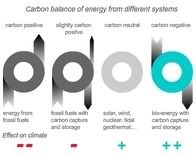IPCC to warn of 'abrupt' climate change: emergency case for carbon-negative biofuels kicks in
 In a very important development, the Intergovernmental Panel on Climate Change (IPCC), which is finalising its landmark synthesis report on global warming, is set to warn of the threat of 'abrupt' climate change. The wording by the UN's climate advisory panel is highly significant because it implies that radical strategies to mitigate the worst effects of these 'abrupt' shifts must now kick in.
In a very important development, the Intergovernmental Panel on Climate Change (IPCC), which is finalising its landmark synthesis report on global warming, is set to warn of the threat of 'abrupt' climate change. The wording by the UN's climate advisory panel is highly significant because it implies that radical strategies to mitigate the worst effects of these 'abrupt' shifts must now kick in.These emergency strategies, developed specifically for the grim scenario of 'Abrupt Climate Change' (ACC) consist of systems based on carbon-negative bioenergy. The Abrupt Climate Change Strategy Group (ACCS), whose mandate is to study ACC and its mitigation, writes that this concept, also known as 'bioenery with carbon storage' (BECS), is one of the few cost-effective and safe geo-engineering options that can be implemented at once and globally. If applied widely, BECS systems can radically reduce greenhouse gas emissions and bring back atmospheric CO2 levels by mid-century.
The ACCS was launched in the wake of the G8's Gleneagles Summit in 2005, to study strategies to cope with "abrupt" forms of global warming. The IPCC's new wording gives credence to the ACCS concepts. This is what ACCS scientists said in one of their papers:
Abrupt Climate Change (ACC - NAS, 2001) is an issue that ‘haunts the climate change problem’ (IPCC, 2001) but has been neglected by policy makers up to now, maybe for want of practicable measures for effective response, save for risky geo-engineering. A portfolio of Bio-Energy with Carbon Storage (BECS) technologies, yielding negative emissions energy, may be seen as benign, low risk, geo-engineering that is the key to being prepared for ACC.So how do carbon negative bio-energy and biofuels work? They are easy to understand. Bioenergy and biofuels production is coupled to soil sequestration of biochar or to geosequestration of carbon dioxide. As biomass grows, it takes up CO2 from the atmosphere, as a carbon capturing machine. When this biomass is then used to replace fossil fuels, and burned in power plants or transformed into liquid fuels, and at the same time the carbon contained in it is captured and stored underground (either in geological formations or in agricultural soils), the net result is negative emissions.
Under strong assumptions appropriate to imminent ACC, pre-industrial CO2 levels can be restored by mid-century using BECS. - Peter Read and Jonathan Lermit
Ordinary biofuels, nuclear power or renewables like solar or wind can never become carbon-negative and do not suffice to tackle 'abrupt climate change'. They are 'carbon-neutral' at best. Negative emissions are only achieveable with biomass coupled to carbon capture and storage (schematic, click to enlarge). By now, Biopact readers are familiar with the concept.
The fact that the IPCC has uttered the most dreadful words imaginable in the context of global warming, namely 'abrupt climate change', means carbon-negative bioenergy now has implicit backing from the leading authority on global warming. Biopact is developing a leaflet introducing BECS to wider audiences who are still not familiar with the concept. It will be available before the end of the month. The case for BECS has finally arrived.
Meanwhile, check out the following introductory scientific sources to learn more about the concept:
 energy :: sustainability :: biomass :: bioenergy :: biofuels :: carbon-negative :: bio-energy with carbon storage :: negative emissions :: global warming :: abrupt climate change :: IPCC ::
energy :: sustainability :: biomass :: bioenergy :: biofuels :: carbon-negative :: bio-energy with carbon storage :: negative emissions :: global warming :: abrupt climate change :: IPCC :: - Peter Read and Jonathan Lermit: Bio-Energy with Carbon Storage (BECS): a Sequential Decision Approach to the threat of Abrupt Climate Change, Energy, Volume 30, Issue 14, November 2005, Pages 2654-2671.
- Stefan Grönkvist, Kenneth Möllersten, Kim Pingoud, "Equal Opportunity for Biomass in Greenhouse Gas Accounting of CO2 Capture and Storage: A Step Towards More Cost-Effective Climate Change Mitigation Regimes", Mitigation and Adaptation Strategies for Global Change, Volume 11, Numbers 5-6 / September, 2006, DOI 10.1007/s11027-006-9034-9
- Noim Uddin1 and Leonardo Barreto, "Biomass-fired cogeneration systems with CO2 capture and storage", Renewable Energy, Volume 32, Issue 6, May 2007, Pages 1006-1019, doi:10.1016/j.renene.2006.04.009
- Christian Azar, Kristian Lindgren, Eric Larson and Kenneth Möllersten, "Carbon Capture and Storage From Fossil Fuels and Biomass – Costs and Potential Role in Stabilizing the Atmosphere", Climatic Change, Volume 74, Numbers 1-3 / January, 2006, DOI 10.1007/s10584-005-3484-7
- David Tilman, Jason Hill, Clarence Lehman, "Carbon-Negative Biofuels from Low-Input High-Diversity Grassland Biomass", Science, 8 December 2006: Vol. 314. no. 5805, pp. 1598 - 1600, DOI: 10.1126/science.1133306
- James S. Rhodesa and David W. Keithb, "Engineering economic analysis of biomass IGCC with carbon capture and storage", Biomass and Bioenergy, Volume 29, Issue 6, December 2005, Pages 440-450.
And the introductions at the Abrupt Climate Change Strategy Group.
Further references:
Biopact: Carbon-negative bioenergy is here: GreatPoint Energy to build biomass gasification pilot plant with carbon capture and storage - October 25, 2007
Biopact: A quick look at 'fourth generation' biofuels - October 08, 2007
 --------------
--------------
 The article
The article 







0 Comments:
Post a Comment
Links to this post:
Create a Link
<< Home